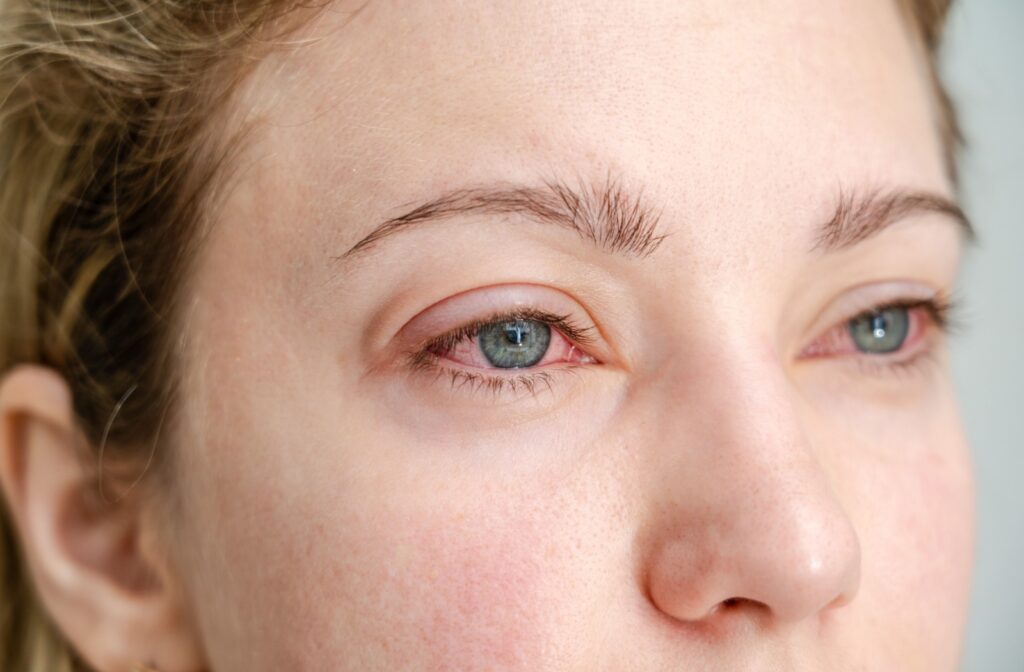Itchy eyes can make your day miserable, whether you’re trying to focus at work or enjoy time outdoors with your family. You might find yourself constantly wanting to rub your eyes, but this only makes the problem worse. Understanding the causes helps you find relief faster through comprehensive eye exams and proper treatment from your eye care team.
Eye itching typically happens because of allergies, environmental irritants, dry eyes, or infections, and the right treatment depends on identifying what’s causing your discomfort.
Common Reasons Your Eyes Feel Itchy
Allergies Cause Most Eye Itching
Seasonal allergies peak during spring and fall in British Columbia, while year-round allergies affect you consistently throughout the year. Your immune system reacts to these substances as if they’re harmful, releasing chemicals that make your eyes itch and water.
- Pollen from trees, grass & weeds
- Pet dander
- Dust mites
- Mould spores
Environmental Irritants
These substances don’t trigger an allergic reaction but can still irritate your eyes directly. You might notice symptoms worsen when you’re exposed to certain environments or products.
- Smoke & air pollution
- Strong perfumes or chemicals
- Wind & dry air
- Makeup or skincare products
Dry Eye Syndrome
When your eyes don’t produce enough tears or when those tears evaporate too quickly, your eyes can start to feel dry, itchy, or gritty—like something is stuck in them. This common condition, known as dry eye syndrome, often becomes more noticeable as we age, but it can also be triggered by screen time, contact lens wear, or certain medications.
Dry eyes can make reading, driving, or working on a computer uncomfortable, but relief is possible. Understanding what’s causing your dry eyes and exploring the right treatments—such as lubricating drops, lifestyle adjustments, or in-office therapies—can help restore comfort and protect your long-term eye health.
Eye Infections
Bacterial or viral conjunctivitis (pink eye) causes itching along with redness and discharge. These infections can spread easily, so proper hygiene becomes important for you and your family. Learn more about conjunctivitis symptoms and treatments to protect your household.
Why You Should Never Rub Your Itchy Eyes
Rubbing your eyes might bring a moment of relief, but it can actually make the itching and irritation worse. The skin and tissues around your eyes are very delicate, and frequent rubbing can cause redness, swelling, or even long-term damage.
Your hands also carry bacteria and allergens that transfer directly to your eyes when you touch them, which can increase irritation and infection risk. Instead of rubbing, try using a cool compress or lubricating eye drops for relief.
Why you should avoid rubbing your eyes:
- It adds more allergens and debris to the eye
- It can scratch or damage the cornea
- It increases the risk of eye infection

Simple Ways to Relieve Itchy Eyes at Home
Cold Compress Treatment
Apply a clean, damp cloth over your closed eyes for 10-15 minutes several times per day. The cold temperature helps reduce inflammation and provides immediate relief from itching.
Artificial Tears
Use preservative-free eye drops to flush out allergens and add moisture to your eyes. You can use these drops as often as needed throughout the day.
Clean Your Environment
Reducing your exposure to allergens helps prevent itchy eyes from starting. These simple changes can make a significant difference in your comfort level.
- Shower after being outdoors
- Wash your hands frequently
- Change pillowcases more often
- Keep windows closed during high pollen days
Contact Lens Care for Itchy Eyes
Proper contact lens hygiene prevents irritation and keeps your eyes comfortable. Poor lens care can trap allergens against your eyes and increase your risk of infection. Professional contact lens fittings ensure proper fit and comfort while following Health Canada contact lens safety guidelines protects your eye health.
- Replace lenses as prescribed
- Clean case daily with fresh solution
- Consider daily disposable lenses
- Remove lenses when eyes are irritated
When Professional Eye Care Can Help
For mild symptoms, over-the-counter eye drops or allergy medications often provide quick relief. However, if your discomfort persists or worsens, it’s important to visit your optometrist for a thorough eye exam. They can help identify the underlying cause, whether it’s allergies, dry eye syndrome, or digital eye strain, and recommend a personalized treatment plan.
Professional treatment options may include:
- Antihistamine or lubricating eye drops for allergies and dryness
- Prescription anti-inflammatory medications to reduce irritation
- Allergy testing or referrals if seasonal or environmental triggers are suspected
- Specialized contact lens fittings to improve comfort and reduce dryness during wear
If screen time is a major factor, your optometrist may also suggest digital eye strain treatments or lifestyle adjustments to protect your vision.
Comprehensive Eye Exams Help Identify Causes
Eye exams can rule out infections and identify underlying conditions causing your symptoms. We use advanced diagnostic technology to examine your tear production, check for allergic reactions, and assess your overall eye health. Understanding the difference between comprehensive eye exams and basic sight tests helps you choose the right level of care.
Professional evaluation becomes particularly important for children’s eye care, as kids often can’t describe their symptoms clearly. We help determine whether your child’s eye rubbing indicates allergies, vision problems, or other issues.
When to See an Eye Doctor
Mild eye itching often clears up with home remedies, but if your symptoms don’t improve after a few days, it’s best to have your eyes checked. You should also schedule an exam if you notice thick discharge, blurred vision, severe pain, or light sensitivity. These can be signs of an infection or another underlying condition that needs professional attention.
At Willoughby Doctors of Optometry in Langley, we take the time to understand what’s causing your discomfort and recommend the right treatment to bring you lasting relief. With advanced diagnostic technology and personalized care, our team is here to keep your eyes healthy and your vision clear.
If your eyes are feeling itchy or irritated, book an appointment today — we’re always happy to help you see and feel your best.











